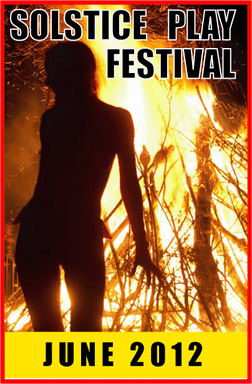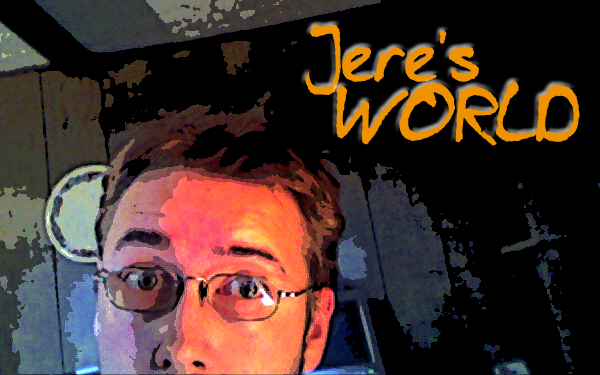10 minute play hits Philadelphia in June  Courtesy of Luna Theater Company Luna Theater Company presents their inaugural new play fest this summer with the Solstice Play Festival and I am thrilled to be involved. Got an email this week from their Literary Manager Jeremy Gable to invite my new 10-minute play, The Cosmonaut in Human Resources, to be part of this week of world premieres! Cosmonaut was developed in my MFA playwriting seminar this past Fall and I'm excited to have its first staging happen at Luna! Here's a line-up of the shows they're producing in this year's festival:
So I created a webseries. Yes. Onto that bandwagon have I jumped (see what I did there, being all clever and referencing a wildly popular webseries next to my own). Why create a webseries? I'll get to that. For the moment, let's all acknowledge this grand experiment, which shall henceforth be known as: In short increments, the tales of a man named Jere (a man not unlike me, and yet not like me) will be parceled out over the internet through the wonders of YouTube. Originally conceived as a project for my Winter Seminar at Ohio University, I am now working to develop it out beyond the one video. It's an interesting process; taking on such a short format. In my MFA program, we attack the 4-5 minute form on a weekly basis, but this is the first time I've ever tried anything so short. And with footage. That needed editing. The experiment here will be to watch how the rest of the series develops... how it showcases me as a writer... what kind of writer will it showcase me to be? Funny? Dark? Sentimental? Upon posting, my professor said he noticed a level of humor in it that he's not accustomed to seeing from me. Maybe that's just my style on the web. There's a lot of heavy stuff out there on the web, so maybe the best way to deal with it is to add a dash of levity. Then again, I chose to set my first episode in an office -- and these days the idea of me back in a cubicle always gets e chuckling. So take a gander. Enjoy. Share. Comment. Don't comment. What-have-you. Thanks for watching! This past week, my colleague Mark Chrisler brought this to my attention. Aside from the fact that it involves one of my favorite video games from my youth (Mega Man and all his glory), it has some fascinating stuff to say about how we learn from watching action in a narrative. The video itself is about 20 minutes and worth your time. It breaks down the pros and cons of video game design and chiefly tackles the idea of conveyance -- a system for teaching the player how to play through gameplay instead of instruction manuals or training levels (as is popular in video games today). As you'll see in the breakdown, Mega Man was fantastic in that it didn't tell you how to play -- you figured out the rules of the world simply by living in it and taking action. With that in mind, I am now paying more attention to plays, TV, film (pretty much any narrative structure) to see if the rules of the world are shown to me by characters taking action and learning or through exposition. That's what I equate instruction manuals to, exposition. That clunky, painful, and (falsely) believed important addition to every play, TV show, and movie you've ever seen. If we can teach audiences the rules of a video game through playing the game (i.e. action), then why can't we teach audience the rules of our plays the same way? Show, don't tell. Isn't that what we're taught. And yet I'm as guilty as the next writer for smearing exposition throughout a play (especially at the outset) so I can make sure everyone is understanding how the world works. Thinking about exposition as the detriment to conveyance has been quite helpful. When ever a character begins to explain anything to anyone, I stop and try to figure out if there is a way for that character to take action and let those actions speak volumes. An example of this happened in AMC's The Walking Dead a couple weeks ago. Without giving away any spoilers, I'll just say that a character needed to lure a zombie over, so he cut his finger and the zombie smelled the blood, wandered close and then stuff happened... the point here is that there were two characters in the scene and the one with the idea didn't stop and explain it. No words were really said. He didn't tell us what he was doing. He took action. That created a reaction. The story continued. Later in the episode, when that other character found himself in a sticky situation, he pulled out a knife and (again, without saying a word) we knew what he had to do. We, the audience, understood a new rule in the world -- all done with action rather than exposition. Sit back and watch the Mega Man breakdown and let me know your thoughts. Does conveyance work on stage, etc.? How would you use it? Are you already doing this? Is there such a thing as "good exposition?" Be warned, the video has some swearing, so it's probably NSFW if you're not wearing headphones (not too mention it's about Mega Man and clearly looks nothing like work unless you're lucky enough to work in a creative field where watching stuff like this is encouraged and rewarded -- and if so, good on you). |
Jeremy's blog
Thoughts. From my brain. Anything to do with how we tell stories and the stories we tell each other. Literally and figuratively. About JeremyWriter. Husband. Father. Effulgent dreamer. A Fightin' Irishman (@NDdotEDU '01). A playwriting Bobcat (MFA in Playwriting, @OhioU '13). I write plays. I'm a geek. I wanted to be an astronaut. I go places in my head.
Categories
All
Archives
January 2022
|



 RSS Feed
RSS Feed
